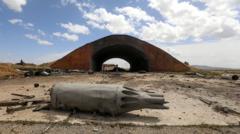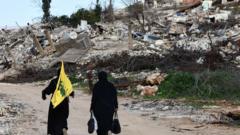The air strikes have not only targeted military bases in Syria but have also conveyed a stern warning aimed at Turkey, as the geopolitical landscape shifts following the regime change in Syria.
**Escalating Tensions: Israel's Air Strikes in Syria Challenge Turkey's Influence**

**Escalating Tensions: Israel's Air Strikes in Syria Challenge Turkey's Influence**
Recent Israeli military actions in Syria signal a heightened confrontation with Turkey amid regional instability.
Israel has intensified air strikes in Syria, targeting critical military installations, including the Hama military airport and the T4 base near Homs. The Syrian government reported that the Hama base suffered near-total destruction, with casualties among defense personnel. Though the strikes were directed at Syrian assets, analysts suggest that Turkey was the actual target, particularly as Israeli officials openly criticized Turkey's role in the region.
The assault followed Turkey's negotiations with Syria's interim president, Ahmed al-Sharaa, regarding a mutual defense agreement, which could involve Turkish military presence in contested areas. The tensions have flared significantly since the outbreak of conflict in Gaza in October 2023, leading to strained diplomatic relations between Turkey and Israel, culminating in trade sanctions and accusations of genocide from Turkey's government.
In response to Israeli actions, Ankara has condemned the strikes, labeling them threats to regional stability. Yet, Turkish officials have attempted to avoid confrontation, insisting on Syria's right to determine its own foreign policy while reaffirming their commitment to negotiate peacefully.
Ahmed al-Sharaa’s leadership, which emerged following Bashar al-Assad's ousting, has focused on reconciliation and establishing stability in the war-torn nation. Despite Sharaa's conciliatory stance, Israel continues to perceive internal and external threats, launching frequent strikes aimed at preventing weapons from reaching hostile groups, particularly Hezbollah.
Notably, while many Syrians hoped for an improved relationship with Israel post-Assad, the ongoing bombings have left a sense of betrayal among some citizens who have come to view Israel as an adversary rather than a neutral party. The fragile state of post-Assad Syria has made it susceptible to external influence, raising concerns that the nation may once again become entrenched in geopolitical conflicts.
Amidst rising violence, including a significant massacre of Alawite civilians, the potential for a rekindling of sectarian strife looms large, underscoring the volatility that persists in this part of the world. As outside powers continue to vie for influence, Syria remains a critical flashpoint for broader regional tensions.
The assault followed Turkey's negotiations with Syria's interim president, Ahmed al-Sharaa, regarding a mutual defense agreement, which could involve Turkish military presence in contested areas. The tensions have flared significantly since the outbreak of conflict in Gaza in October 2023, leading to strained diplomatic relations between Turkey and Israel, culminating in trade sanctions and accusations of genocide from Turkey's government.
In response to Israeli actions, Ankara has condemned the strikes, labeling them threats to regional stability. Yet, Turkish officials have attempted to avoid confrontation, insisting on Syria's right to determine its own foreign policy while reaffirming their commitment to negotiate peacefully.
Ahmed al-Sharaa’s leadership, which emerged following Bashar al-Assad's ousting, has focused on reconciliation and establishing stability in the war-torn nation. Despite Sharaa's conciliatory stance, Israel continues to perceive internal and external threats, launching frequent strikes aimed at preventing weapons from reaching hostile groups, particularly Hezbollah.
Notably, while many Syrians hoped for an improved relationship with Israel post-Assad, the ongoing bombings have left a sense of betrayal among some citizens who have come to view Israel as an adversary rather than a neutral party. The fragile state of post-Assad Syria has made it susceptible to external influence, raising concerns that the nation may once again become entrenched in geopolitical conflicts.
Amidst rising violence, including a significant massacre of Alawite civilians, the potential for a rekindling of sectarian strife looms large, underscoring the volatility that persists in this part of the world. As outside powers continue to vie for influence, Syria remains a critical flashpoint for broader regional tensions.



















